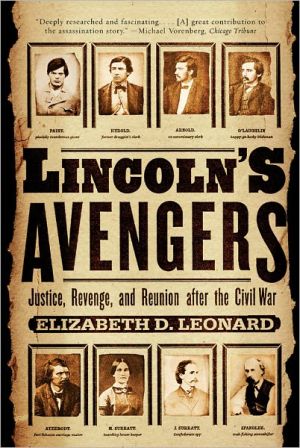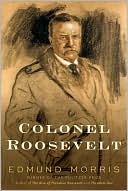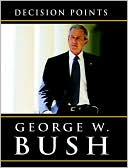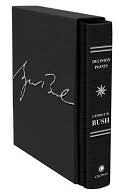Lincoln's Avengers: Justice, Revenge, and Reunion after the Civil War
On April 14, 1865, Abraham Lincoln was murdered by John Wilkes Booth, and Secretary of State William H. Seward was brutally stabbed. Clearly a conspiracy was afoot. Judge Advocate General Joseph Holt was put in charge of the investigation and trial. He first set out to punish all of Booth's accomplices and then wanted to go after Jefferson Davis, whom he felt had instigated the assassination—despite stern opposition, not least of all from Lincoln's successor, Andrew Johnson. Elizabeth D....
Search in google:
Did the federal government mete out justice or revenge in response to Lincoln's assassination? Publishers Weekly Colby College historian Leonard (Yankee Women) writes with clarity and balance about the oft-conflicting quests for justice, revenge and peace in the troubled early years of Reconstruction. Moving from Lincoln's assassination to Grant's inauguration, Leonard exhumes Judge Advocate General Joseph Holt to serve as the book's focus. Holt had the task of prosecuting the alleged conspirators in the assassination plots against Lincoln and Secretary of State William H. Seward, as well as Andersonville commandant-cum-war criminal Henry Wirz. The understudied Holt a former slaveholder and Kentucky loyalist, but also a staunch and vengeful Unionist makes a fascinating central figure, and early on Leonard confesses her "sympathy and compassion" for the man. The book, however, is scrupulously fair to Holt's legacy, which encompassed a dedication to justice and truth, but also a zeal that bred the enmity of such powerful men as Andrew Johnson and Secretary of the Navy Gideon Welles. "If, like Lincoln himself," Leonard writes, "he must stretch both law and convention in some measure to save the Republic, Holt was quite prepared to do so." Her analysis of the motivations of Holt's main foil, Johnson, is sparse, which is understandable considering Johnson kept no diary and was a poor correspondent. But she significantly challenges the received wisdom that Johnson carried on Lincoln's legacy of leniency, arguing that Johnson was a much more avid supporter of "undemanding reconciliation" with the South. By arguing what "Lincoln might have done," Leonard deals in counterfactuals that some readers will certainly contest. Overall, however, the book is exquisite history, as Leonard makes excellent use of overlooked primary materials to weave a taut narrative with fluid prose. (Mar.) Copyright 2004 Reed Business Information.
PrefaceAcknowledgments1"That Fearful Night": The Assassination and the Making of an Avenger32"A Vindictive Clique of Villains": The Pursuit and Capture of the Suspects333"A Disposition to Preserve Law and Order": Joseph Holt and the First Trial of the Assassins674"A Stupendous Retribution": Conviction and Punishment of Eight Co-Conspirators1035"In Violation of the Laws and Customs of War": Going After Henry Wirz of Andersonville1376"Forbearance and Forgiveness": Andrew Johnson's Vision for Southern Restoration1657"Traitors, Confessed Perjurers and Suborners": The Unraveling of Revenge1938"A Well-Dressed and Very Presentable Young Man": The Trial of John Surratt, Jr.2299"The Wicked Man Now Acting as President": The Trial of Andrew Johnson and the Collapse of Holt's Agenda265Epilogue291Notes305Index357
\ Publishers WeeklyColby College historian Leonard (Yankee Women) writes with clarity and balance about the oft-conflicting quests for justice, revenge and peace in the troubled early years of Reconstruction. Moving from Lincoln's assassination to Grant's inauguration, Leonard exhumes Judge Advocate General Joseph Holt to serve as the book's focus. Holt had the task of prosecuting the alleged conspirators in the assassination plots against Lincoln and Secretary of State William H. Seward, as well as Andersonville commandant-cum-war criminal Henry Wirz. The understudied Holt a former slaveholder and Kentucky loyalist, but also a staunch and vengeful Unionist makes a fascinating central figure, and early on Leonard confesses her "sympathy and compassion" for the man. The book, however, is scrupulously fair to Holt's legacy, which encompassed a dedication to justice and truth, but also a zeal that bred the enmity of such powerful men as Andrew Johnson and Secretary of the Navy Gideon Welles. "If, like Lincoln himself," Leonard writes, "he must stretch both law and convention in some measure to save the Republic, Holt was quite prepared to do so." Her analysis of the motivations of Holt's main foil, Johnson, is sparse, which is understandable considering Johnson kept no diary and was a poor correspondent. But she significantly challenges the received wisdom that Johnson carried on Lincoln's legacy of leniency, arguing that Johnson was a much more avid supporter of "undemanding reconciliation" with the South. By arguing what "Lincoln might have done," Leonard deals in counterfactuals that some readers will certainly contest. Overall, however, the book is exquisite history, as Leonard makes excellent use of overlooked primary materials to weave a taut narrative with fluid prose. (Mar.) Copyright 2004 Reed Business Information.\ \ \ \ \ Library JournalLincoln is assassinated and Secretary of State William H. Seward then stabbed: were the trials revenge or reconciliation, muses the author of Yankee Women. Copyright 2003 Reed Business Information.\ \ \ Kirkus ReviewsIf Lincoln's assassination was the final shot of the Civil War, the punishment of those responsible was a decisive step in casting the course of Reconstruction. So argues Leonard (History/Colby Coll.; All the Daring of the Soldier, 1999, etc.), who focuses on Joseph Holt, head of the Union's Bureau of Military Justice. In early 1865, the 58-year-old Holt, a staunch Union man despite his southern origins, gave thanks for Lee's surrender and the end of the Confederacy. John Wilkes Booth's murder of the president came as a complete shock. The machinery of law enforcement went into high gear in search of the assassins; within days, Booth was shot to death in a burning barn near Port Royal, Virginia. His demise meant that questions would forever linger about the fates of his eight alleged co-conspirators, whose military trial was orchestrated by Holt. Leonard carefully and impartially summarizes the tribunal, pointing out the dubious nature of testimony from several key witnesses-notably Louis J. Weichmann, who may have been as guilty as any of the accused-and the exceptional zeal with which Holt prosecuted his case. Four of the defendants were hanged, the rest imprisoned. John Surratt Jr., whose mother was one of those executed, stayed at large for more than a year before being captured, but his trial ended with a hung jury. Meanwhile, President Andrew Johnson pardoned numerous Confederate officials and military officers, vetoed laws meant to expedite full citizenship for ex-slaves, and attempted to fire Holt and his superior, Secretary of War Edwin Stanton. Outraged, the radical Republican Congress responded by impeaching Johnson, falling one vote short of conviction in the Senate. With theelection of Ulysses S. Grant to succeed Johnson, the Reconstruction effort faded into a familiar story of apathy, ineptitude, and corruption. Competent and detailed, yet a curiously bloodless account of an era whose events can still stir violent passions.\ \








